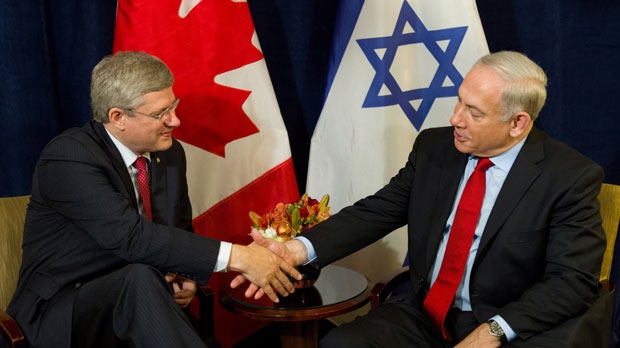(Picture from The Canadian Press/Sean Kilpatrick)
From the moment Prime Minister Harper’s landmark Middle Eastern tour was announced, the biggest talking point was always going to be Harper’s stance on the Israel-Palestine dispute and how his stance could affect Canada’s standing in the Middle East. Thus, it came as no surprise that Harper’s first two stops on the tour were Israel and Palestine. Harper’s activities included meeting with both Israel’s Benjamin Netanyahu and Palestine’s Mahmoud Abbas. He even had time to make another substantial financial commitment to Palestine reaffirming Canada’s support for a quick solution to the dispute, but nothing more in depth than that.
However, the stand-out moment on Harper’s first day was undoubtedly his controversial speech to the Israeli Knesset at the close of the day. The speech’s main point was reaffirming Canada’s long time commitment to Israel. Harper said that in this day and age, it was of both “moral imperative” and “strategic importance” for Canada to back Israel. Ordinarily, none of this sounds controversial. Canadian support for Israel has been around for so long that it has become a pillar of Canadian Middle Eastern policy. However, the speech’s aggressive tone is what drew all the attention. Some of the controversial statements in the speech included Harper’s claim that hatred for Israel was connected to hatred for freedom of people everywhere and hatred for the “the differences of peoples and cultures.”He also stated that Israeli criticism carried heavy anti-Semitic undertones and represented the newest form of anti-Semitism threatening to gain a foothold in the world today. Harper also linked hatred for Israel to terrorism by claiming that most of the forces that hate and pose a serious threat to Israel’s existence are the same forces that have, since September 11th, become the biggest threat to international peace and security. Harper refused to give in to demands by some parts of the international media to single out Israel for criticism without having a legitimate reason to do so. According to him, Israel is the only state in the Middle East “in which human rights, political stability and economic prosperity may flourish.”
The speech immediately polarized large sections of Canadian society. Some praised Harper for not compromising values and taking a stand for Israel in the face of adversity while others criticized him with some characterizing his relationship with Netanyahu and Israel as borderline obsessive and accusing Harper of compromising Canadian integrity abroad. Regardless of where we stand on it, Harper’s speech could prove to be very significant for Canada down the road in the context of Canada’s standing in the international community.
Harper’s speech is in keeping with his long term plan for Canada that involves Canada carving out a new, much more assertive role for itself in the international community. Canada, for the last 150 plus years has always been known as a side kick to a superpower, whether it was Britain before the Second World War or The United States since then. Furthermore, Canada, by virtue of Lester Pearson’s Suez legacy in the 1950s has also been widely touted as a peacekeeping nation that was perfect for the role of neutral arbiter. Part of Harper’s plan is to demonstrate that Canada can move out of the shadow of its southern superpower neighbor and take decisions for itself. One of the tools he has employed to achieve this is public declarations of intent. It would explain why Harper adopted an especially strong pro-Israel stance in his speech at a time when the American relationship with Israel is in a lull . It also explains why Harper wants to maintain tough sanctions on Iran at a time when even the American relationship with Iran is probably at its highest point since 1979 and at a time when the rest of the major actors in the international community are increasingly willing to negotiate with Iran. The feeling could be that Canada has come of age and is now in the position to take stances that will matter on important international issues that differ from its superpower neighbor’s views
On the other hand, the speech could yet prove to be a miscalculation that could result in Canada losing prestige on the international stage. On the regional stage, the speech’s heavy pro-Israel bias and tirade against Israel’s critics could alienate most of the Middle East who do not have as high an opinion of Israel, leaving Canada in a less ideal situation in the Middle East than it already was before Harper’s tour. It could also affect Canada on the wider world stage. While it may yet be just rhetoric, Harper maintaining his hardline stance on Iran at a time when progress appears to be made on the nuclear issues, and exploration of a new permanent deal has started, threatens to leave Canada isolated in the diplomatic community. Diplomatic isolation would then suggest that Canada might not have as influential a voice in the international community as it thinks it does. On the whole, the Harper speech is highly unlikely to change the way the United States or any other Middle Eastern state sees Israel and that in itself is telling when Canada’s international influence is properly examined.




